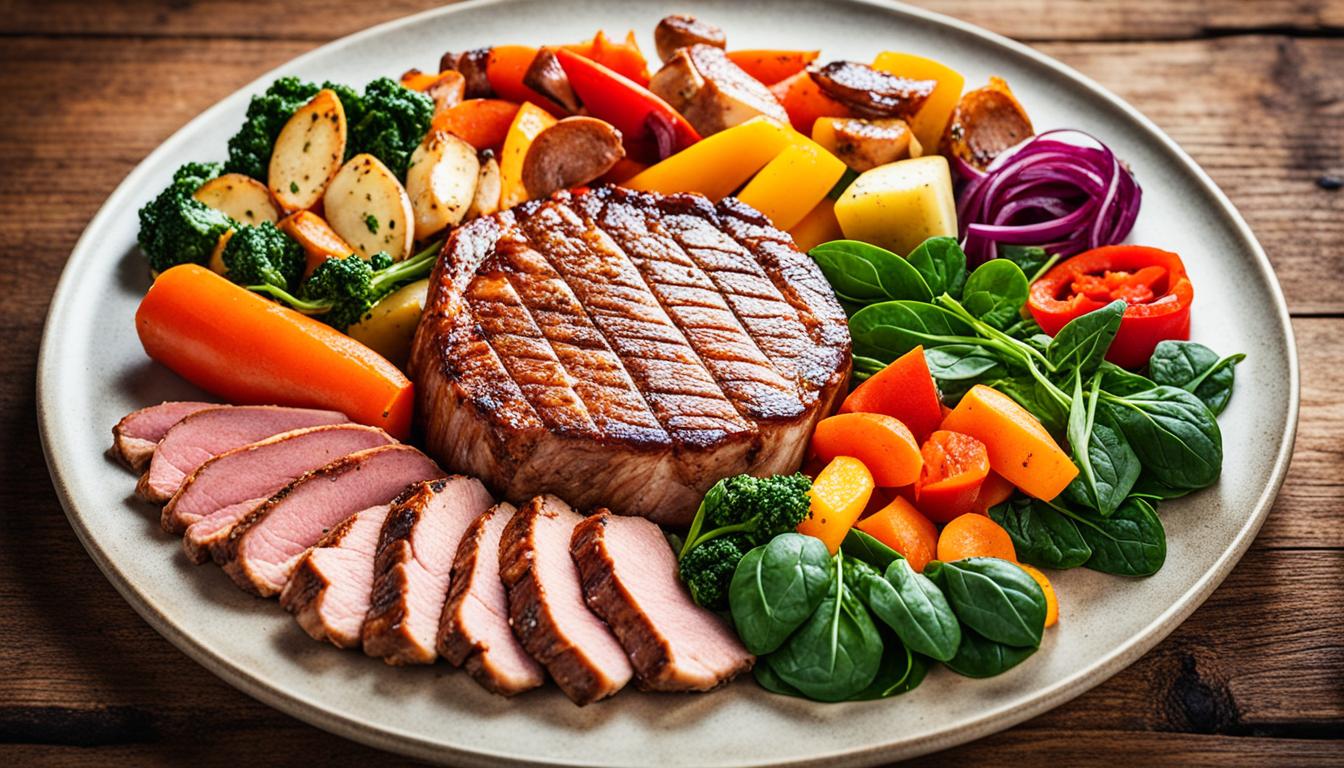Carnivore GAPS Diet: Heal Your Gut Naturally
Did you know that gut health has a direct correlation to the immune system, mental health, autoimmune disease, digestive disorders, and more?
The gut microbiome, consisting of trillions of microorganisms in the gut, plays a crucial role in regulating gut integrity and function. Poor gut health can be caused by factors such as a poor diet, medications, food intolerances and allergies, chronic stress, chronic GI infections, and environmental toxins.
Two popular dietary approaches that focus on improving gut health are the GAPS Diet and the Carnivore Diet. These diets offer unique benefits and can help address gut imbalances and diseases.
Key Takeaways:
- The gut health is essential for overall wellness and is linked to various health conditions.
- The GAPS Diet and the Carnivore Diet are dietary approaches that promote gut healing.
- The GAPS Diet emphasizes nutrient-dense whole foods and the consumption of fermented foods.
- The Carnivore Diet focuses on animal products and eliminates all plant-based foods.
- Consult with a healthcare professional before making significant changes to your diet.
Understanding the GAPS Diet
The Gut and Psychology Syndrome (GAPS) Diet, developed by Dr. Natasha Campbell-McBride, is a nutritional approach designed to restore gut integrity and address a compromised gut microbiome. This diet aims to improve overall gut health through the elimination of processed foods, grains, refined sugars, and dairy products. Instead, it emphasizes the consumption of nutrient-dense, whole foods.
The GAPS Diet encourages the intake of meat, fish, vegetables, fruits, homemade broth, and fermented foods. These foods provide essential nutrients that support the growth of beneficial bacteria in the gut, reduce inflammation, and promote optimal gut health. Additionally, the diet allows for the consumption of healthy fats such as coconut oil and animal fats, which provide essential fatty acids and support overall gut function.
Research has shown that the GAPS Diet can be beneficial for individuals with various digestive disorders, autoimmune diseases, and mental health issues. By following this diet, individuals may experience improvements in symptoms such as bloating, gas, diarrhea, constipation, and mood disorders.
An important aspect of the GAPS Diet is the emphasis on properly preparing and cooking foods. This includes methods such as using traditional cooking techniques, fermenting foods, and making homemade bone broth. These practices help preserve the nutrient content of the foods, making them more easily digestible and bioavailable.
Overall, the GAPS Diet provides a holistic approach to gut health, focusing on nutrient-dense foods, fermented foods, bone broth, and organ meats. By following this diet, individuals can support their gut microbiome and promote optimal gut function.
*Image depicts a variety of nutrient-dense foods that are commonly included in the GAPS Diet.*
Exploring the Carnivore Diet
The Carnivore Diet is a popular dietary approach that focuses on the consumption of animal products. Unlike other diets that include a variety of plant-based foods, the Carnivore Diet eliminates all plant-based foods such as vegetables, fruits, and grains. Instead, it emphasizes the intake of animal products, particularly high-quality, grass-fed, and pasture-raised sources.
On the Carnivore Diet, you primarily consume protein and healthy fats from fatty cuts of meat. These animal products provide essential nutrients and nourishment for the body. To further enhance the nutritional value, the diet encourages the consumption of organ meats and bone broth, which are nutrient-dense foods.
The Carnivore Diet is a high-fat diet that promotes weight loss, improved digestion, increased energy, and mental clarity. By eliminating carbohydrates and relying on animal fats for energy, the body enters a state of ketosis, where it burns fat for fuel instead of glucose.
In addition to focusing on animal products, the Carnivore Diet incorporates intermittent fasting as a way to improve overall health and aid in weight loss. By incorporating periods of fasting, the diet promotes fat burning and metabolic flexibility.
The Carnivore Diet has gained popularity among individuals seeking a simple and highly restrictive diet that eliminates the potential triggers found in plant-based foods. However, it is important to note that like any dietary approach, the Carnivore Diet may not be suitable for everyone. It is recommended to consult with a healthcare professional before making any significant changes to your diet.
Comparing the GAPS Diet and the Carnivore Diet
When it comes to improving gut health, both the GAPS Diet and the Carnivore Diet have their own unique approaches and benefits. However, they differ significantly in terms of dietary restrictions and food choices.
The GAPS Diet emphasizes the elimination of processed foods, grains, refined sugars, and dairy products. Instead, it encourages the consumption of nutrient-dense, whole foods. The diet includes foods like meat, fish, vegetables, fruits, homemade broth, and fermented foods. The GAPS Diet aims to restore gut integrity and promote the growth of beneficial bacteria.
On the other hand, the Carnivore Diet takes a more extreme approach by eliminating all plant-based foods. It focuses on animal products, particularly fatty cuts of meat and organ meats. The diet advocates for the consumption of high-quality, grass-fed, and pasture-raised animal products to ensure optimal nutrient intake.
Both diets have the potential to improve gut health by reducing inflammation and improving digestion. However, it is important to consider the potential drawbacks and risks associated with each diet. The GAPS Diet may pose challenges for those with dietary restrictions or sensitivities, while the Carnivore Diet may lead to nutrient deficiencies and may be difficult to sustain in social settings. It is always advisable to consult with a healthcare professional before making significant changes to your diet.
Source Links
- https://www.doctorkiltz.com/leaky-gut-diet/
- https://www.nutritionwithjudy.com/carnivore-diet-gut-health
- https://casadesante.com/blogs/easy-to-digest/gapsdiet-vs-carnivorediet
- George Conway Weight Loss: My Healthy Journey! - May 19, 2024
- Menopause Diet: 5-Day Plan to Shed Pounds - May 18, 2024
- Diet Cranberry Juice: My Healthier Sip Choice - May 16, 2024





Post Comment
You must be logged in to post a comment.